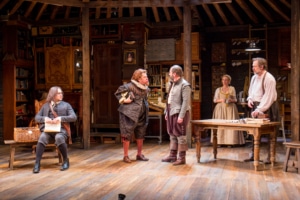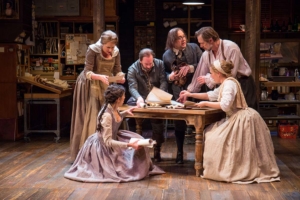DCPA NEWS CENTER
Enjoy the best stories and perspectives from the theatre world today.
Enjoy the best stories and perspectives from the theatre world today.
This article was published on April 14, 2016
By Douglas Langworthy
There may not be a play by Shakespeare in next season’s Theatre Company lineup, but there is certainly a play about Shakespeare. In her new play The Book of Will, playwright Lauren Gunderson recounts the trials and tribulations of the publication of the 1623 first Folio, the repository of Shakespeare’s plays and arguably the most valuable book after the Bible. Filled with fascinating details of the Elizabethan publishing world, Gunderson keeps her focus on the people who, against all odds, made it happen. “It’s a play about friendship, about brotherhood and sisterhood, and love and loss,” Gunderson says, “so it felt like a great story for theatre and of theatre.”

Rodney Lizcano, Triney Sandoval, Liam Craig, Jennifer Le Blanc, Kurt Rhoads. Photo Credit: Adams VisCom.
Actors John Heminges and Henry Condell, the two remaining founding members of Shakespeare’s original theatre company, realize three years after the Bard’s death and just after the death of Richard Burbage, the company’s leading actor, that many of the texts were on the verge of being lost forever. So the two men, along with their wives and Heminges’ daughter Alice, decide to gather all of his plays and have them printed in a single volume. Sounds easy enough, but in those days contemporary plays were not yet considered literature and, as a result, Shakespeare had not carefully preserved his manuscripts, many of which had already been lost or misplaced. Fortunately in addition to tracking down these first drafts, Condell and Heminges had a few alternate places to search for his texts.
There were the promptbooks that were copied from the manuscripts for the stage manager at the Globe Theatre. There were the actor’s “sides” — each actor was given only his own lines and cues in an attempt to thwart the pirating of plays so common at that time. By putting together a number of sides, the text could be pieced back together. Also, many of the plays had found their way into print as cheap “quartos,” the mostly fraudulent play-scripts that were often wildly inaccurate. The quartos each contained a single play, were printed on flimsy paper and roughly the size of paperback, and were intended to be a convenient reference for the theatre-hungry Elizabethan audiences. Some of those mangled texts were the result of faulty transcription of the boys who were sent to the performances and charged with writing down the dialogue. So the editorial team had to determine which documents were closest to Shakespeare’s original intent, sometimes assembling the text from more than one source, filling in the cracks with Heminges’ and Condell’s own memories.

Company of ‘The Book of Will’ by Lauren Gunderson
Then there was the matter of the rights. There were no copyright laws protecting playwrights in Elizabethan England — bizarrely whoever published the play first owned the rights. And since about half of Shakespeare’s titles had been published in quarto, alliances had to be made with the very publishers who had stolen his plays in the first place.
Then Condell and Heminges had to determine the size and quality of the book. Only the large-format folio would be able to contain all of the plays in a single volume. They also chose the finest paper from Normandy.
It would be a very expensive book, and only the second collection of plays ever published in folio — the first being a volume of fellow playwright Ben Jonson’s work. But most importantly for the preservation of Shakespeare’s plays, the quality of the printing meant the book would last. Without the two actor’s efforts, “we would not have had Shakespeare in the way we know and love him,” says Gunderson.
This play is steeped in research and true to the facts as we know them. When the historical record is silent, Gunderson’s imagination takes over. For instance, we know that John Heminges had a daughter named Alice, but we don’t know if she played a role in the editing of the book. Many scholars think that Emilia Bassano-Lanier was “the Dark Lady” of the sonnets, but the idea that she lent her financial support to the Folio project is conjecture. It did cost a penny to stand and watch a play at the Globe Theatre, and it did cost a pound to buy a copy of the first Folio.
Research aside, The Book of Will (which is a Theatre Company commission and supported by the DCPA’s Women’s Voices Fund, an endowment that supports the work of female playwrights) courses with the hustle and bustle of Elizabethan London. The staid John Heminges is the perfect counterbalance to his impulsive friend Henry Condell. Both men receive tremendous support from their stalwart wives, Rebecca and Elizabeth. Our two heroes are surrounded by a colorful and lively cast of characters: the calculating publisher William Jaggard, his earnest son Isaac, the smart and sassy Alice Heminges, the dedicated and hard-working Ralph Crane (the Globe’s scribe and the book’s chief editor), the bombastic Richard Burbage, and the self-absorbed playwright Ben Jonson.
The Book of Will is a love letter to Shakespeare, a tribute to his friends and a slice of theatre history you’ll be surprised you’ve never heard before. Knowing the lengths to which his friends and contemporaries went to preserve his work is as meaningful as a production of the Bard himself — therefore supplanting him, if only for a season, for your enjoyment and enlightenment.

Leave a Reply
Want to join the discussion?Feel free to contribute!